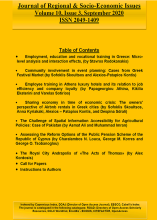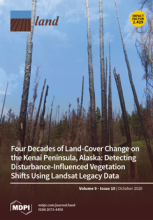/ library resources
Showing items 1 through 9 of 147.Mapping the characteristics and extent of environmental conflicts related to land use is important for developing regionally specific policies.
Agriculture is directly linked to the socio-economic development of every region. Agriculture impacts us all, whether we are seeking food security, better health or striving to conserve natural resources.
Over the past two decades, academics and development practitioners have written extensively about the harmful impact of corruption on economic development and social outcomes.
Innovation is an inevitable way to enhance regional competitiveness, promote urbanization and achieve sustainable development. The sci-tech park is one of the main land use types in the construction of a new town and the critical space carriers of urbanization.
Astrotourism is considered to be a modern form of ecotourism.
Due to industrial civilization, the decline of the countryside has become a global phenomenon. Spain is a good example that reflects this issue in the rural areas of the European Union because more than half of all municipalities in the country are at risk of extinction.
This paper considers the landscape as both a material and an ideological representation and starts from the assumption that spatial patterns arise as a result of the ideological imperative of the process that forms the landscape.
This paper offers an approach to Yucatecan social reality in terms of entrepreneurship and the process of creating companies dedicated to the production and/or commercialization of agroecological products, considering its contribution to sustainable rural development.
This paper investigates the phenomenon of spatial chaos in Poland resulting from urban sprawl.
Pagination
Land Library Search
Through our robust search engine, you can search for any item of the over 73,000 highly curated resources in the Land Library.
If you would like to find an overview of what is possible, feel free to peruse the Search Guide.




